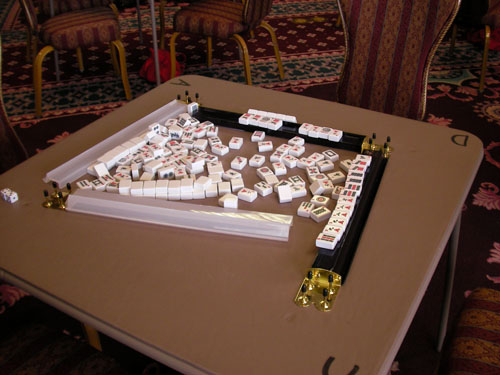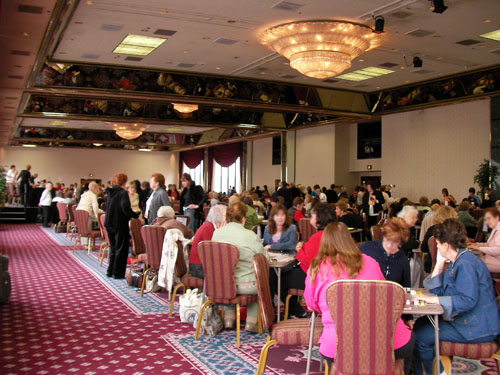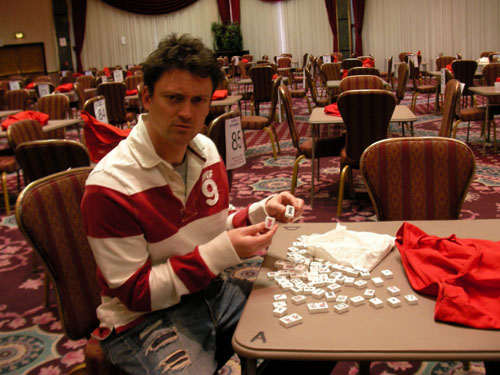March 26, 2007

Jenn's Corner #10: Las Vegas
Here we are, back in Tokyo after our travels to our homeland. Since my last post, we have added a scoring section to the rules, and a report on JPML's first ever Women's League. Our next immediate goals (besides staying up to date on columns) is to get an interview with Michi Yuuki, JPML's first-ever Women's League Champion! Today, I want to let you all know how our trip “abroad" went.

American Style Mahjong Set
Because of tournaments we were committed to in Tokyo, Garthe and I arrived towards the end of the first day of Mahjong Madness's Las Vegas American-style Mahjong tournament at the Riviera. We had already been in contact with the organizer, so they knew we were coming, but somehow managed to get plenty of stares from the participants, who seemed a bit more unawares. This was a surprise to me. Apparently, Garthe and I do not fit the profile for Mahjong players anywhere in the world! I think I like that. It makes us and Mahjong stand out more as well.
We brought as an offering, a Japanese-style Mahjong set, which was given out on the second day as a door prize. After seeing this, many of the participants became very friendly and we talked for hours about Mahjong: American and Japanese as well. We heard what people thought of tournaments, what they thought of certain rules, and how long they had been playing (some for 50 years or more!). The most surprising thing was the perception of the rules in the East. When we would proudly mention that we play Japanese-style Mahjong, we got some amazing responses. One person was quoted as saying, “Oh. You guys don't have any rules, right?" How do you answer that? Well, yes, of course we have rules… How can you win a game that doesn't have rules? Or even better, how can you lose a game that doesn't have any rules? One of the biggest differences is that the American-style rules change every year while the Japanese-style rules have not changed for many years.
Our biggest treat, was watching some of the players after the tournament hours, playing in private games. Here we got to watch 2 of the only players in the competition that don't need to look at the scorecard while playing. We watched some big hands, exchanged words and contact info and got some in depth explanations of the rules. This helped for the final day, when we went to watch the 400 participants battle it out for the 18 cash prizes.

400 Competitors prepare for battle
We learned about the Charleston, a way for the players to collect useful tiles before the play actually begins. Each person exchanges 3 tiles with each other player a few times. We learned about Jokers, which cannot be used as single tiles or with pairs, but can be used (exclusively even) in groups of 3 tiles or more. We learned that scores are counted by each hand and not by each round as in other types of Mahjong. We learned that the opinion that something has to be at stake (e.g. money by gambling) for a high-skill game translates to as many American-style Mahjong players as it does to us. And we learned that many people who are interested in Mahjong, have interest in other types of Mahjong as well.

Garthe trying to figure out what the Green Dragon looks like
For me, this was a very encouraging trip. I have often had doubts of the potential popularity of Reach Mahjong because of the complicated rules, scoring
system, etc. But after watching this American-style tournament, I realized that, like languages, each interpretation of Mahjong has its own complications. With American-style, since the hands change each year, it creates a big challenge for players to memorize hands, giving those that can a huge edge. Most people end up using their cards while playing. With Reach Mahjong, the scoring is a bit complicated, but once it is memorized, it is memorized forever. There are no [significant] changes taking place. Beginning players could keep a score table at their side if needed in any tournaments or games that we would want to host in the future.
I hope that some of the great people we met are now visiting ReachMahjong.com and I would like to say thank you for taking such good care of us in Las Vegas. I hope someday to visit again.
After the tournament was over, we spent almost all of our time at the poker tables, learning how to play. We're getting better! Honestly, playing and learning about poker has also improved my Mahjong game. We are also meeting many poker players interested in adding Mahjong to their repertoire. We'll be back in Vegas the 2nd week of April, so if anyone is going to be in town, drop us an e-mail, maybe we could set up a Mahjong game somewhere!

3 comments:
Another excellent column!
A bit off topic, but...
Has anyone in this group ever read the manga 'Gambling Apocalypse Kaiji'? It looks like the same person who wrote and drew the Akagi manga. It also seems to show many unusual variations of play which I'd love to learn (the same author introduced the "clear tiles" in Akagi). Unfortunately I don't read Japanese! If anyone has read this or could explain some of the new rules (the only issue I've seen is #2), that would be great.
On a related topic. There seems to be so much literature, animation, video games etc.. about Mahjong in Japanese. I would love to see more of it in English. Is there a company one could petition to try and get more? I know it isn't popular here in the States but the manga "Hikaru no Go" has been selling here and getting more kids into Go than ever before. I'd love if the same thing could happen for Mahjong.
dwillems,
Hey there! Yes, I've read some of it. It is the same person who wrote Akagai, and Ten (Akagi's sequel, written before Akagi).
Let me look at it again and maybe I'll do a column in the future about the games in the book.
There are TONS of comics and strategy books in Japanese. I think it is a great idea and I am actually working on some of those ideas right now!
First priority right now, is of course Ron2~ Once people have a place to play, it will be easier to say, Let's do it!!
great
Post a Comment